Drake Behrakis on creating a new legacy for our kids
Drake Behrakis was a teenager when he first visited Greece with his family and discovered a whole other world of family and history and culture.

“That really sparked the flame in my family,” says the 55-year-old real estate investor and chairman of the National Hellenic Society (NHS), which since its inception ten years ago has made it its mission to send as many kids as possible to Greece through its signature Heritage Greece program.
“The idea is to send kids over to their homeland so they can learn and reconnect with who they are and come back with a renewed sense of what ancient Greek culture provided to the world and how it’s still relevant in their world today,” Behrakis says.
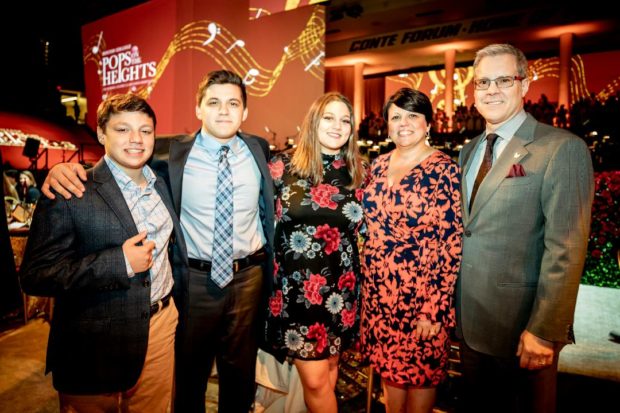
The Behrakis Family: Drake and Maria with children Dimitri, George and Zoe
To date, nearly 500 college and graduate students have spent the society-sponsored two weeks in Greece in what the NHS calls a “cultural and educational immersion odyssey” with their peers at the American College of Greece in Athens on its 65-acre campus in the suburb of Agia Paraskevi. Included is a one-credit language and culture course, supervised field trips and on-site classes and recreational and educational excursions.

Maria and Drake Behrakis
And selected students can choose to stay an additional two weeks in the society’s internship program and get to work in a Greek business with an American College peer, all expenses paid.
“And the demand is there,” says Behrakis. “This year we sent 70 students, but we had 500 applications. And when the kids come back they come back energized and with a new sense of purpose and they want to keep the momentum going.”
Which is why the society has expanded to sponsor or co-sponsor a number of other programs for young Greek Americans. Together with the lobbying firm Manatos & Manatos the society developed a NHS Heritage America Program, where kids can visit Washington DC and meet a who’s who of Greek American legislators, business leaders and movers and shakers. It even sponsors a MyParea.com social networking website to connect Greek American kids and highlight their heritage.
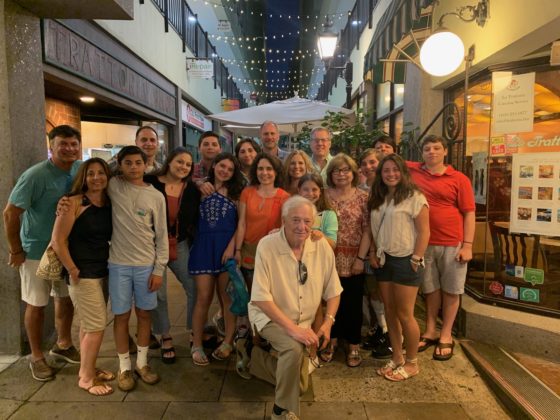
Thanasi Liakos, Stephanie Liakos, Dean Liakos, Peter Yianopoulos, Zoe Behrakis, George Behrakis, Callope Frankel, Sebastian Frankel, Elena Frankel, Davide Frankel, Joanna Yianopoulos, Marisa Yianopoulos, Drake Behrakis, Margo Behrakis (mother), Christian Yianopoulos, Maria Behrakis, Margo Liakos, Demetri Behrakis. Front row George Behrakis (father)
“All this is addressing the issue that the demographics for Greek American kids has changed in America,” says Behrakis. “It’s becoming more and more apparent that more Greek kids are products of mixed marriages and interfaith marriages and they’re not as close to their ethnicity or their faith as they were during my generation, when I grew up pretty much around the church, which also had a parochial school.”
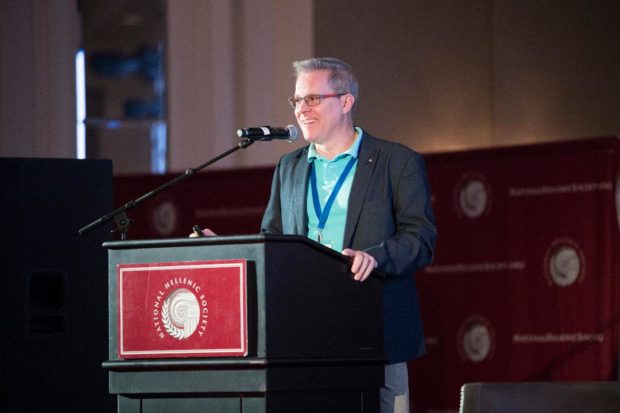
Addressing the National Hellenic Society Convention
The society, based in Virginia, and with chapters throughout the country and a board of leading Greek Americans (George Marcus was a founding father), has also promoted Hellenism through joint ventures with the National Hellenic Museum on a “Spirit of the Marathon” traveling exhibit, a cooking and travelogue show of Greece, “My Greek Table” with Diane Kochilas shown on PBS, and with the National Geographic Society a documentary called “The Greeks” and a correponding traveling exhibit.
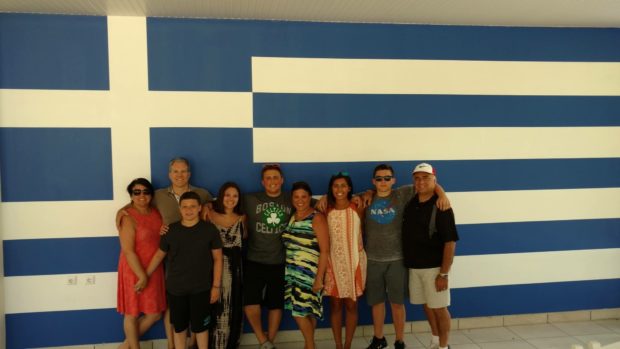
Maria Behrakis, Drake Behrakis, Demetri Behrakis, Zoe Behrakis, Stathis Kalemkeridis, Athena Kalemkeridis, Ellie Kalemkeridis, George Behrakis, Themistoklis Kalemkeridis
“We do what we can with not only the network of our membership, but the general network in the Greek American community,” says Behrakis. “We try as much as we can do to make the appropriate connections so (a newer generation) can stay active and engaged. And it could very well be with another organization, that’s perfectly fine: we’re not doing this so we can increase our membership. We’re doing it to make sure that our community has a strong foundation going forward and we’re not losing our ethnicity over time because we’re not engaging the best we can.”
Behrakis himself is a product of the generation that did go to church regularly and did attend Greek parochial school. He was born in Virginia but his family moved back to Lowell, Massachusetts when he was just two and he grew up there at the Holy Trinity Parish and attended the school and then graduated Lowell High School.
“We had a strong bond in the community growing up,” he says. “Everything revolved around the church: I was an altar boy, I was in GOYA, I played on the church basketball team. It was definitely a transition going from that to public middle school and high school (because there were no Greek schools) and getting into the multicultural aspects of the city.”
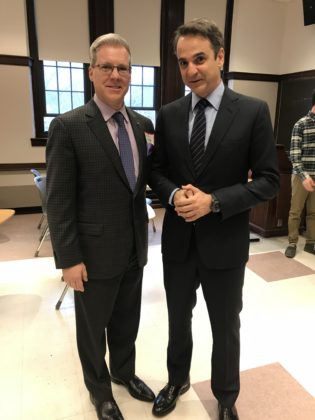
With Greece’s Prime Minister Kyriakos Mitsotakis
But he already knew how to speak Greek very well.
“I learned it through my parents, and grandparents, but also from the parochial school program,” he says. “And it was a challenge after that, because I couldn’t do it consistently, but it was one thing I tried to maintain over time and speak to my own kids.”
He attended Boston College and got a master’s in finance from Northeastern (he endowed Boston College and established there the Behrakis Family Professorship in Hellenic Studies), before he became an analyst at Gillette and then started working with his father, George, the pharmaceutical industrialist and pioneer, at his own Muro Pharmaceuticals.
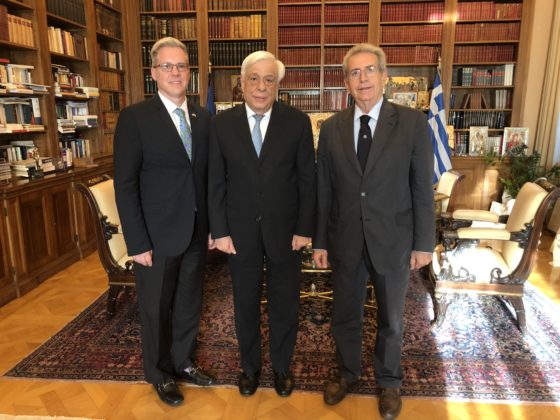
Drake with President of Greece Prokopis Pavlopoulos and cousin Panagiotis Behrakis
“Working with my dad, I got a good experience of learning what made him successful in the pharmaceutical business and why health care was so important to him,” he says.
And working with his dad was not an obligation.
“My parents were pretty, pretty open-minded,” he says. “Their expectations for us were not that we expect you to do what we do. We want you to be your own people. Hopefully you can learn from what we’ve done in our lives, but your career is going to be your career.”
As his own career, Drake Behrakis chose real estate and while still in his twenties he started Marwick Associates (suggested by his father for the two streets where he himself grew up as a kid in Lowell—Market and Fenwick).
Marwick handles properties mostly in and around the Boston area (industrial buildings, retail plazas, multi-tenant office buildings), though the company did venture into Washington, DC to buy the Kalorama Heights building which once housed the Press Office of the Greek Embassy and in New York the New York City Press and Information Office near the United Nations (which it later sold).
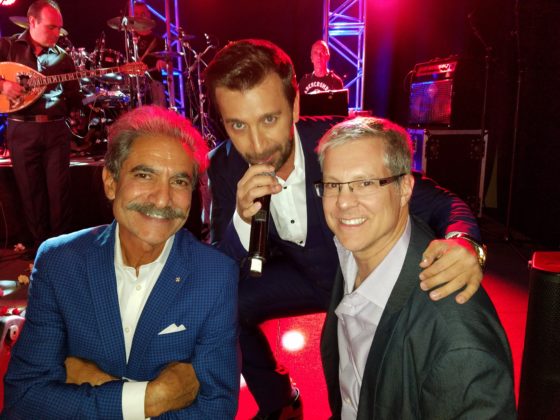
Jimmy Pantelidis and Drake with Greek singer Thanos Petrelis
“The Greek government was selling it and they went through the process twice,” he says of the DC building. “The first time we weren’t involved and nothing happened. The second time we were invited to bid. You go into it a little blind, but you rely on people you know to get up to speed. Usually, we take a very conservative and steady approach.”
He says real estate prices are very high right now around every major city, such as New York, which he says is the El Dorado of the real estate market, but the big markets like New York are jealously guarded and hard for any outsider to break in who doesn’t have the billions to spend.
“You try not to ride the waves of the real estate market and the investor market,” he says, which today is full of brio and inflated prices in the big cities, including Boston. “We try to be conservative as much as we can and not get emotional about our purchases.”
It was around the time he formed his company that he went on a blind date and did get emotional and propose to his wife, Maria, who was working in the financial securities industry (Putnam and Fidelity) and they now have three children: George, Zoe and Demetri. George is a senior at Tufts studying economics and music: “He’s graduating in the spring and he’s got some ideas where he lands,” says his father. Zoe is in her second year at Boston College, and Demetri is still in high school.
They all speak Greek, because their parents made a point of it.
“First of all, they all grew up in the church,” says their father. “And one of the thing we did, which my parents never did, which is interesting, we spoke exclusively Greek to them in the house before they went off to school. Because we knew the kids were going to be going to public school or private school and speak English. So we wanted to start them on Greek as a foundation.”
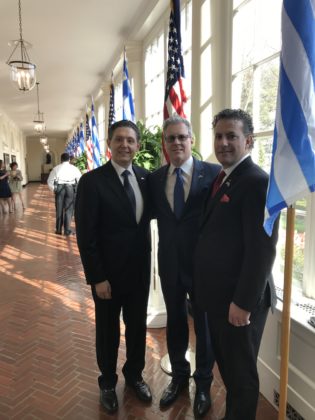
George Soterakis, Drake Behrakis, Michael Bapis
And he hopes they will take advantage of the opportunities organizations like NHS provide to keep their language and their heritage intact.
“The biggest challenge I see for them,” he says, “and what motivates me, is to create opportunities for the next generation like theirs to be active and engaged. Not to force their heritage down their throats, but make it a part of their life and something they’re comfortable with.”
Part of it, he says, is the example his parents gave him and the example he and his wife have set.
“They see what we’ve done and they’ve grown up in the culture and so they have that foundation,” he says. “Yes, they’re at the age now where they’re more independent and are doing their own thing, but you hope to find ways to keep them involved with the community, even though they might not do it exactly as you did.”
In part, he says, he was voted chairman of the board at NHS because he was in a unique position to connect the generation of his parents and his children’s generation.
“Somebody around the right age, the 50-year-old group, who could bridge the gap between the elders that we all know and love and made this country so great for Greek Americans,” he says. “But also they were looking for somebody who had a lot of ideas and was passionate about their culture and, frankly, came from a family that already exhibited a very strong legacy of not only giving, but supporting and being passionate about Hellenism and Orthodoxy and family.”
But, he says, you can’t predict the future, including with his own kids.
“I think my wife and I have done a good job keeping them active and busy,” he says. “But they’re finding what makes sense to them and their lives. Will all three of them marry Greeks? Our daughter comes right up and says, Oh, there’s no way I’m marrying somebody who’s not Greek. We’ll see. We’ll see what happens. You can’t predict the future, but I think we’ve created a good foundation for them. And going to Greece was a good first step for me, and my kids, and for every kid who wants it in our community.”

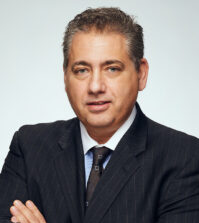
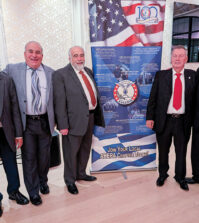
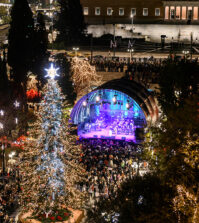











0 comments